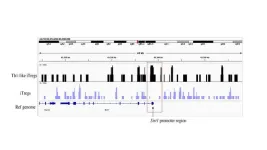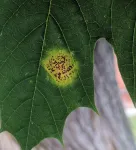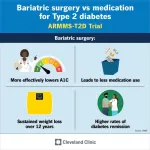UMass Amherst researchers identify enzyme key to training cells to fight autoimmune disorders
The discovery of a new signaling pathway in immune cells may lay the foundation for drug-free, side-effect-free treatments for patients with aplastic anemia and other autoimmune disorders
2024-02-27
(Press-News.org) Februay 27, 2024
UMass Amherst Researchers ID Enzyme Key to Training Cells to Fight Autoimmune Disorders
Discovery of new signaling pathway in immune cells may lay the foundation for drug-free, side-effect-free treatments for patients with aplastic anemia and other autoimmune disorders
AMHERST, Mass. – Researchers at the University of Massachusetts Amherst recently released a first-of-its-kind study that focuses on the rare autoimmune disorder aplastic anemia to understand how a subset of cells might be trained to correct the overzealous immune response that can lead to fatal autoimmune disorders. The research, published in Frontiers in Immunology, identifies a specific enzyme, known as PRMT5, as a key regulator of suppressive activity in a specialized population of cells.
The human immune system is a marvel of evolution. When a pathogen enters the body, immune cells can identify it, call for backup, attack the pathogen and then, when the threat has been eradicated, return to a peaceful state. But sometimes, as in the rare autoimmune disorder aplastic anemia, something goes wrong.
In patients with aplastic anemia, the aberrant immune cells, in this case Th1 cells, misidentify healthy stem cells in bone marrow as pathogenic and attack them. Without these bone-marrow stem-cells, the body can’t make white blood cells to fight infections, red blood cells to carry oxygen through our body or platelets that help stop bleeding.
“What we want to do is to make a super-suppressive cell,” says Nidhi Jadon, graduate student in the Department of Veterinary and Animal Sciences at UMass Amherst and the paper’s lead author. “If someone is suffering from an autoimmune disorder, we can use these super-suppressive cells to dampen the aberrant immune response instead of drugs.”
While drug therapies that manage autoimmune responses can be lifesaving, they also come with a long list of potentially debilitating side effects. It would be much more effective if the body’s own defense system could be retrained—and to see how retraining might happen, Jadon and the paper’s senior author, Lisa M. Minter, professor of veterinary and animal sciences at UMass Amherst, relied on a pathbreaking mouse model that Minter developed in 2013 and which closely mimics the human immune responses characteristic of aplastic anemia.
This mouse model has been engineered with Th1 cells that cause aplastic anemia. Jadon, Minter and their colleagues then worked on training the cells responsible for suppressing the immune response—called iTregs—in the specific chemical environment that the aberrant Th1 cells create around themselves. This chemical environment is one means that Th1 cells use to call for backup, drawing even more Th1 cells into the bone marrow, where they attack and destroy the stem cells.
What Jadon and Minter observed is that the iTregs they created were very effective at reducing the Th1-mediated immune response in their animal model of aplastic anemia. When they looked closer, they discovered that iTregs trained in the Th1-like chemical environment increased production of a specific enzyme, called PRMT5, which, in turn blocked the expression of another specific gene—Sirt1—that destabilizes iTregs and makes them less effective.
“No one before us has shown that PRMT5 plays such an important role in mediating the immune suppressive capacity that iTregs display, when they are generated under conditions found in a Th1-mediated immune response,” says Minter, who is quick to note that it takes a long time to turn a foundational discovery like this one into a therapeutic treatment available in the clinic. And there’s more work to be done: the team wants to focus on additional genes that may be regulated by PRMT5 and how they may also contribute to making iTregs better at suppressing immune responses.
Nevertheless, the mouse models treated with re-trained iTregs showed a significantly extended survival rate. “We’re one step closer to finding that super-suppressive cell that can replace drug therapies,” says Jadon.
Contacts: Lisa M Minter, lminter@vasci.umass.edu
Daegan Miller, drmiller@umass.edu
END
[Attachments] See images for this press release:


ELSE PRESS RELEASES FROM THIS DATE:
2024-02-27
It has long been known that there is a complex interplay between genetic factors and environmental influences in shaping behavior. Recently it has been found that genes governing behavior in the brain operate within flexible and contextually responsive regulatory networks. However, conventional genome-wide association studies (GWAS) often overlook this complexity, particularly in humans where controlling environmental variables poses challenges.
In a new perspective article publishing February 27th in the open-access journal PLOS Biology ...
2024-02-27
Biodiversity appears to strongly suppress pathogens and pests in many plant and animal systems, but this “dilution effect” can vary strikingly in magnitude
This study uses forest inventory data from over 25,000 plots to show that the prevalence of tree pests is jointly controlled by the diversity and phylogenetic composition of forests
#####
In your coverage, please use this URL to provide access to the freely available paper in PLOS Biology: http://journals.plos.org/plosbiology/article?id=10.1371/journal.pbio.3002473
Press-only preview: PENDING
Contact: Andrew Gougherty, andrew.gougherty@usda.gov
Image ...
2024-02-27
Tuesday, February 27, 2024, CLEVELAND: Research by Cleveland Clinic and three other U.S. medical centers has found that bariatric surgery provides better long-term control of blood glucose levels in patients with obesity and type 2 diabetes, compared with medical therapy.
Study participants who had bariatric surgery also experienced higher rates of complete diabetes remission up to 12 years after their surgical procedure.
The research was published in JAMA.
The Alliance of Randomized trials of Medicine vs Metabolic Surgery in Type 2 Diabetes (ARMMS-T2D) consortium analyzed long-term results of four randomized trials that were ...
2024-02-27
A research study led by the Keck School of Medicine of USC found that certain combinations of foods consumed during pregnancy may be linked to a higher likelihood of developing preeclampsia, a potentially life-threatening blood pressure condition that can have serious consequences for both mother and baby.
The study, which focuses on low-income Hispanic women in Los Angeles, suggests that different combinations of foods in a woman's diet during pregnancy have the potential to increase or reduce the likelihood of preeclampsia development, and that interventions in diet during pregnancy may help reduce the risk of preeclampsia.
It is known that Hispanic women develop ...
2024-02-27
People who are diagnosed with head and neck cancer often receive a standard type of chemotherapy as part of their treatment. If they are exposed to secondhand smoke during chemotherapy — even if they have never smoked themselves — the treatment may be far less effective at killing cancer cells. That finding, considered the first of its kind, was revealed in a study recently published by researchers at the University of Oklahoma Health Sciences.
Tobacco use is a well-established risk factor for cancer and a signal of poor outcomes, especially ...
2024-02-27
[Boston, MA—February 27, 2024] Research recently published early online in journals of the American Meteorological Society demonstrates changes at the Earth’s poles, including altered ocean-sea ice dynamics, dampened temperature extremes, and differing responses to solar radiation at the north and south poles, and suggests that long-term warming trends may have played more of a role in 2023’s record-low Southern Ocean ice than previously supposed.
Three papers in the Journal of Climate (JCli) find that the Arctic and Antarctic appear to be adjusting to a warming climate with fundamental changes in regional climate dynamics.
The Antarctic ocean-sea ice system may be fundamentally ...
2024-02-27
Even as it's become clear that an inherited susceptibility to some cancers is more common than once thought, genetic testing of family members of cancer patients hasn't increased as much as experts had hoped. A new study led by researchers at Dana-Farber Cancer Institute and Brigham and Women’s Hospital demonstrates that a remote online genetic education program can be a powerful motivator for people with a family history of cancer to undertake genetic testing.
The GENetic Education, Risk Assessment, and TEsting (GENERATE) study included 601 people from across 45 states who had a close relative with the most common form of pancreatic cancer. Participants ...
2024-02-27
ROCHESTER, Minn. — A recent Mayo Clinic study examining the effects of daylight saving time (DST) on heart health suggests that the impact is likely minimal.
In the nationwide study, researchers applied an advanced statistical model to look for any connections between DST and serious cardiovascular problems, including heart attacks and strokes. The study looked at 36,116,951 adults aged 18 and up across most U.S. states. (Arizona and Hawaii were excluded since these states do not observe DST.)
Researchers focused on the week directly after the spring and fall DST transition, ...
2024-02-27
A new tool could reduce costs for diagnosing infectious diseases.
Biomedical researchers from The University of Texas at Austin have developed a new, less expensive way to detect nuclease digestion – one of the critical steps in many nucleic acid sensing applications, such as those used to identify COVID-19 and other infectious diseases.
A new study published in the journal Nature Nanotechnology shows that this low-cost tool, called Subak, is effective at telling when nucleic acid cleavage occurs, which happens when an enzyme called nuclease breaks down nucleic acids, such as DNA or RNA, into smaller fragments.
The traditional way of identifying nuclease ...
2024-02-27
Two Tufts-related initiatives have been included in the White House’s new round of public and private sector commitments, announced today by the Biden-Harris administration, to end hunger, improve nutrition, and reduce diet-related disease in the United States by 2030. The White House Challenge to End Hunger and Build Healthy Communities continues the Biden-Harris administration’s work started at the historic White House Conference on Hunger, Nutrition, and Health that was held in September 2022, encouraging stakeholders from all corners to develop bold commitments to help achieve the administration’s five key pillars of national ...
LAST 30 PRESS RELEASES:
[Press-News.org] UMass Amherst researchers identify enzyme key to training cells to fight autoimmune disorders
The discovery of a new signaling pathway in immune cells may lay the foundation for drug-free, side-effect-free treatments for patients with aplastic anemia and other autoimmune disorders






